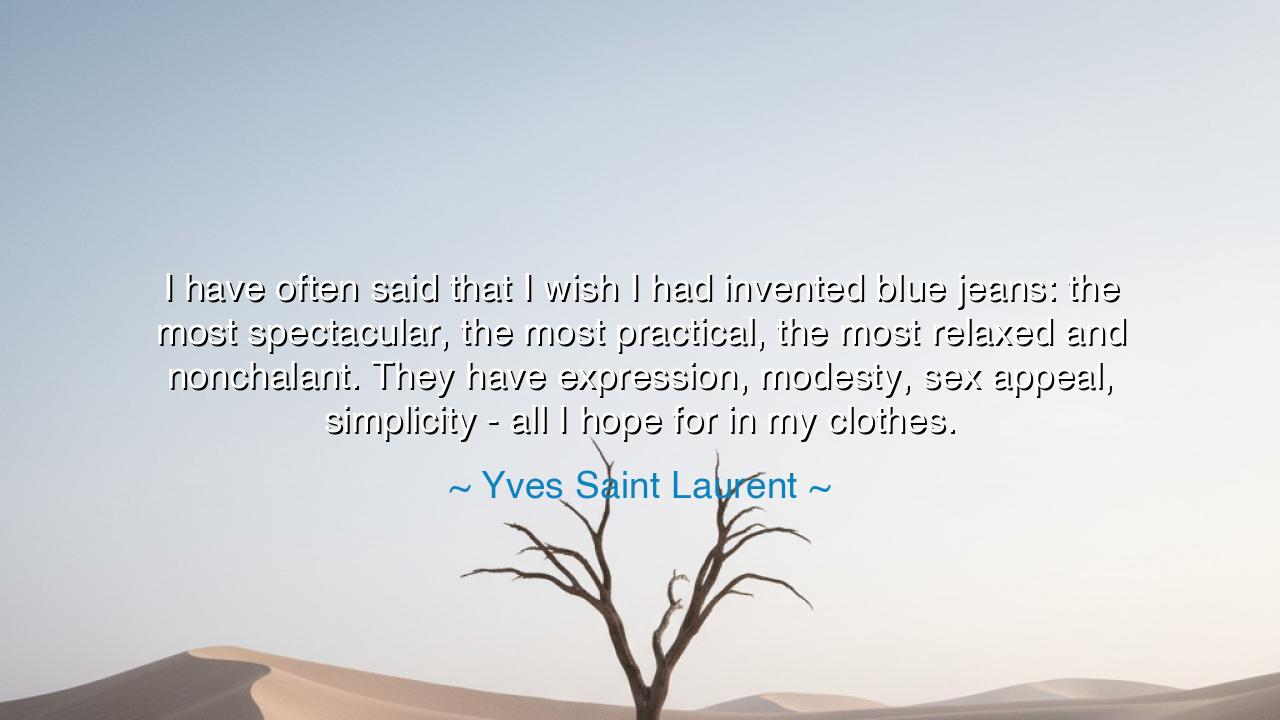
I have often said that I wish I had invented blue jeans: the most
I have often said that I wish I had invented blue jeans: the most spectacular, the most practical, the most relaxed and nonchalant. They have expression, modesty, sex appeal, simplicity - all I hope for in my clothes.






“I have often said that I wish I had invented blue jeans: the most spectacular, the most practical, the most relaxed and nonchalant. They have expression, modesty, sex appeal, simplicity — all I hope for in my clothes.” Thus spoke Yves Saint Laurent, the master of elegance and rebellion, whose genius reshaped the very language of fashion. His words, though spoken of cloth and thread, touch upon something far deeper than garments. They speak of humanity itself—of authenticity, utility, and beauty woven together into a single, enduring form. In his praise of the humble blue jean, Saint Laurent honored not only a garment, but an idea: that true art, like true beauty, is both eternal and accessible, born not of extravagance but of simplicity perfected.
When Yves Saint Laurent uttered these words, he stood at the pinnacle of haute couture, a world of silks, jewels, and precision. Yet he bowed his head to denim, the fabric of laborers, rebels, and dreamers. Why? Because he recognized in blue jeans the paradox that all great art strives toward—the meeting of the ordinary and the divine. Jeans are at once universal and intimate, democratic and seductive. In their faded indigo threads lies the story of human endeavor, of toil and freedom, of rebellion and belonging. To Saint Laurent, blue jeans were not fashion—they were truth.
The origin of this reverence reaches back to the 19th century, when Levi Strauss and Jacob Davis first crafted durable denim trousers for workers in the American West. They were built not for beauty but for endurance, not for show but for purpose. And yet, in their rugged simplicity, they became timeless. From miners and cowboys to artists and icons, blue jeans transcended class and culture. They became the great equalizer—a garment that belonged to all, that spoke the language of the earth. In the eyes of Saint Laurent, this was the highest form of design: function elevated into poetry.
The ancients, too, would have understood his admiration. The philosopher Plato taught that beauty is the harmony of usefulness and form, that the good and the beautiful are one. So it is with blue jeans, whose appeal lies not in ornament but in balance—between form and function, freedom and restraint, modesty and allure. Like the sculptors of Greece who carved perfection from common marble, Saint Laurent saw in denim the proof that greatness needs no luxury, only truth of purpose and integrity of design. The jeans, to him, were not mere clothing—they were the embodiment of timeless virtues: humility, resilience, and grace.
Consider how jeans have lived through the ages of rebellion and renewal. James Dean wore them in Rebel Without a Cause, turning them into a symbol of youth and defiance. Marilyn Monroe wore them and made them luminous with femininity and power. From the fields to the streets, from factory floors to fashion runways, blue jeans became the uniform of freedom—the body’s declaration that beauty can be comfortable, and elegance can be effortless. They carry the expression of the individual and the universality of the human condition, exactly as Saint Laurent desired his own creations to do.
When Saint Laurent said he wished he had invented them, he was confessing admiration not for the fabric itself, but for what it represents: the democratization of beauty. For centuries, fashion was the language of privilege; the poor clothed themselves in necessity, the rich in extravagance. But denim broke that boundary. It brought the noble and the humble together, made art a part of daily life. Saint Laurent saw in this the very essence of his philosophy—that true style is not separation but connection, not pretense but authenticity. To wear jeans is to belong—to history, to humanity, to oneself.
The lesson, my listener, is this: seek beauty in simplicity, and dignity in the ordinary. Do not be deceived by grandeur or excess. The things that endure—like blue jeans—are those that serve a purpose and reflect the soul of their maker. Live your life as the denim of the spirit: strong, honest, flexible, and true. Wear your existence with the same ease—with humility and grace, but with the quiet power of self-assurance. Remember that the most spectacular things are not always the most adorned, but those that stand the test of time by being real.
So, remember the words of Yves Saint Laurent, the poet of fabric and form: “I wish I had invented blue jeans.” For in that wish lies a deeper truth—that greatness is not in creating what dazzles the eye, but in shaping what touches the world. Let your life, like denim, be woven of purpose and passion, worn by time yet made more beautiful through its trials. And when your story, too, has faded into the soft blue of memory, may it remain—simple, strong, and forever alive in the hearts of those who follow.






AAdministratorAdministrator
Welcome, honored guests. Please leave a comment, we will respond soon